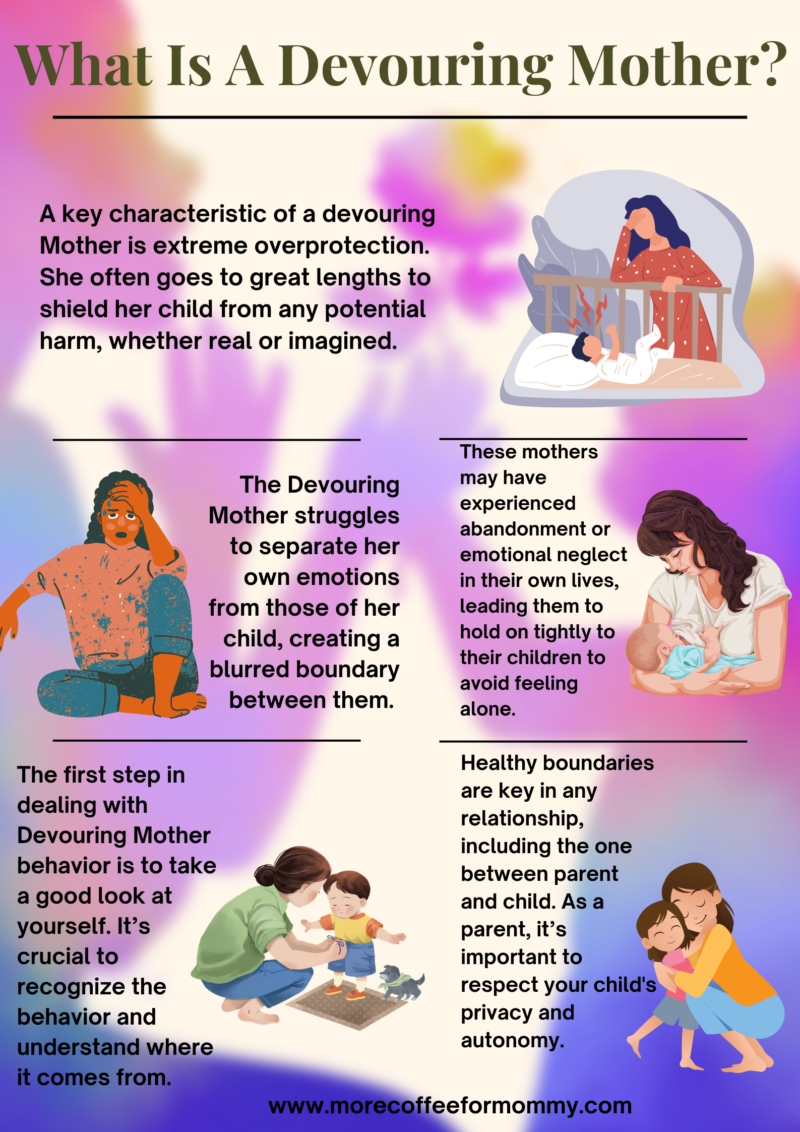Parenting is an art that often balances on a tightrope between nurturing and overprotecting. Every parent wants to keep their child safe, loved, and cared for. However, when that love becomes all-consuming, it can lead to a phenomenon known as the “Devouring Mother.”
This term, as intimidating as it sounds, reflects a parenting style where the mother’s need to protect and control overshadows the child’s need for independence. While this behavior often stems from love and good intentions, it can have lasting effects on a child’s ability to grow into a self-sufficient adult.

Characteristics of a Devouring Mother
While every parent might exhibit some of these traits occasionally, the defining factor is the intensity and consistency with which these behaviors occur.
1. Overprotection and Control
A key characteristic of a Devouring Mother is extreme overprotection. She often goes to great lengths to shield her child from any potential harm, whether real or imagined. While protecting a child is a natural instinct, this mother takes it to an extreme, preventing the child from experiencing failure, disappointment, or independence.
2. Emotional Enmeshment
Emotional enmeshment occurs when a mother becomes excessively involved in her child’s emotional life. The Devouring Mother struggles to separate her own emotions from those of her child, creating a blurred boundary between them. This can lead the child to feel responsible for their mother’s emotional well-being, placing an unfair emotional burden on them.
3. Sacrificial Behavior

The Devouring Mother often sees herself as someone who sacrifices everything for her child. While some level of self-sacrifice is normal in parenting, this mother takes it to an extreme, often using her sacrifices as a way to control or guilt the child.
As a result, the child may feel a strong sense of obligation or indebtedness, leading to a cycle of dependency that is hard to break.
4. Invasion of Privacy
A Devouring Mother typically has little respect for her child’s privacy. She may intrude into every aspect of the child’s life, from their friendships to their personal thoughts and feelings.
5. Fear of Abandonment
At the core of a Devouring Mother’s behavior is typically a deep fear of abandonment. These mothers may have experienced abandonment or emotional neglect in their own lives, leading them to hold on tightly to their children to avoid feeling alone. This fear can result in controlling and possessive behavior, as the mother seeks to keep the child close at all costs.
The Impact on Children

Being raised by a Devouring Mother can have deep and lasting effects on a child. These children often face emotional and psychological challenges that trace back to their upbringing.
- Struggles with Independence: Kids raised by Devouring Mothers typically find it hard to develop a sense of independence. Since their mother made most of their decisions and protected them from failure, they might lack confidence in navigating life on their own. As adults, this can lead to dependency, where they feel unsure about making decisions or taking risks without someone else’s guidance.
- Boundary Issues: These children frequently struggle with setting and maintaining boundaries. Growing up with a mother who constantly invaded their privacy and emotional space makes it hard for them to establish healthy boundaries in relationships. It can cause problems in both personal and professional settings, as they may find it difficult to assert their needs and desires.
- Low Self-Esteem: The overprotection and control of a Devouring Mother typically lead to low self-esteem. When a child isn’t allowed to make mistakes or take risks, they might start to believe they’re incapable or inadequate. This can result in a lack of confidence and a fear of failure that follows them into adulthood.
- Feelings of Guilt and Obligation: Children of Devouring Mothers typically carry a heavy sense of guilt and obligation toward their mothers. The mother’s sacrificial behavior can make the child feel indebted, leading them to prioritize pleasing their mother over their own needs and desires. This can make it hard for them to establish independence and lead to a pattern of putting others’ needs first.
- Emotional Enmeshment: Emotional enmeshment makes it difficult to form healthy, independent relationships. These children may struggle to separate their emotions from those of others, leading to codependent relationships where they feel responsible for the emotional well-being of their partner or friends.
How to Recognize and Address the Problem
If you think you or someone you know might be showing signs of Devouring Mother behavior, it’s important to address it to build healthier relationships and support the child’s independence. Here are some steps that can help in recognizing and managing this behavior.
Take a Moment for Self-Reflection and Awareness
The first step in dealing with Devouring Mother behavior is to take a good look at yourself. It’s crucial to recognize the behavior and understand where it comes from. Reflect on your own upbringing and think about how your experiences may have shaped your parenting style. Understanding the root of your behavior can help you start making changes.
Encourage Independence
One of the best ways to counter Devouring Mother behavior is to support your child’s independence. Give them the freedom to make decisions, take risks, and learn from their mistakes. It can be hard to let go, but allowing your child the space to grow on their own is essential for their long-term well-being.
Set Boundaries
Healthy boundaries are key in any relationship, including the one between parent and child. As a parent, it’s important to respect your child’s privacy and autonomy. Setting clear boundaries can help avoid emotional entanglement and foster a healthier dynamic between you and your child.
There’s Nothing Wrong With Seeking Professional Help!
If changing your behavior on your own feels overwhelming, seeking professional help can be really useful. A therapist or counselor can offer guidance and support as you work through these issues. They can help you develop healthier parenting approaches that encourage your child’s independence while maintaining a loving and supportive relationship.
Wrapping It Up
We all know that parenting is full of challenges, and wanting to protect and care for your child is completely natural. But when that care becomes overwhelming or controlling, it can turn into what’s known as the Devouring Mother dynamic.
It’s important to recognize this behavior and address it to build a healthy relationship with your child, where both of you can thrive.

